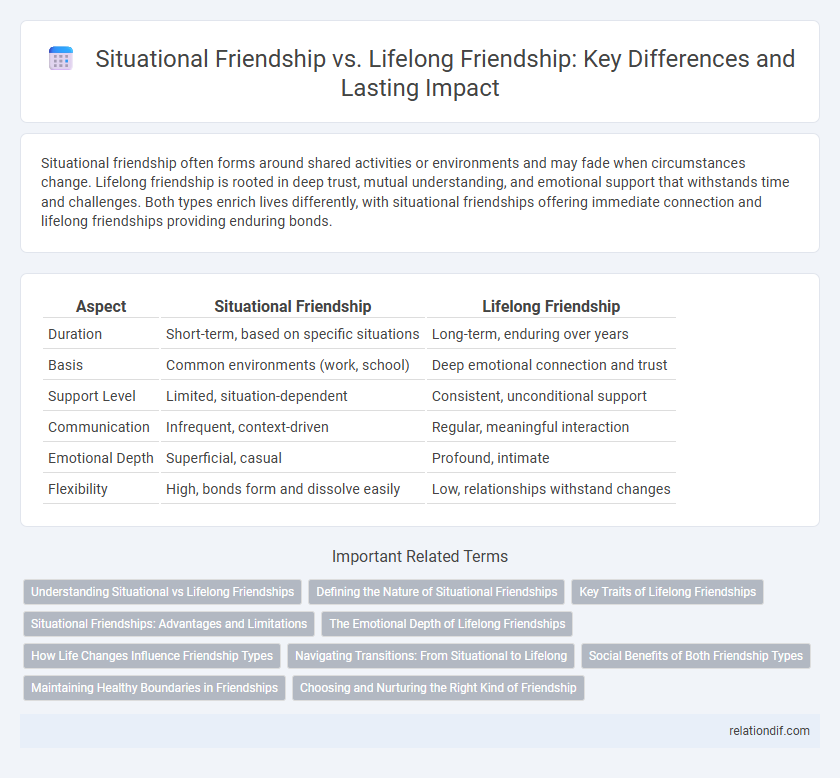Situational friendship often forms around shared activities or environments and may fade when circumstances change. Lifelong friendship is rooted in deep trust, mutual understanding, and emotional support that withstands time and challenges. Both types enrich lives differently, with situational friendships offering immediate connection and lifelong friendships providing enduring bonds.
Table of Comparison
| Aspect | Situational Friendship | Lifelong Friendship |
|---|---|---|
| Duration | Short-term, based on specific situations | Long-term, enduring over years |
| Basis | Common environments (work, school) | Deep emotional connection and trust |
| Support Level | Limited, situation-dependent | Consistent, unconditional support |
| Communication | Infrequent, context-driven | Regular, meaningful interaction |
| Emotional Depth | Superficial, casual | Profound, intimate |
| Flexibility | High, bonds form and dissolve easily | Low, relationships withstand changes |
Understanding Situational vs Lifelong Friendships
Situational friendships, often formed around shared activities or environments, tend to be temporary and based on specific contexts such as work or school, offering immediate support but limited depth. Lifelong friendships develop through sustained emotional bonds, trust, and shared experiences that evolve over time, providing enduring support and deep understanding. Recognizing the differences in commitment and emotional investment between situational and lifelong friendships enhances the ability to nurture meaningful, long-term connections.
Defining the Nature of Situational Friendships
Situational friendships arise from shared circumstances such as workplaces, schools, or common activities, often characterized by convenience and specific contexts. These relationships typically lack the depth and emotional investment found in lifelong friendships, which are built on trust, shared experiences, and enduring commitment. Understanding situational friendships involves recognizing their temporary nature and the role context plays in shaping interactions and mutual support.
Key Traits of Lifelong Friendships
Lifelong friendships are characterized by deep trust, unwavering support, and emotional resilience that withstands the test of time and changing circumstances. These bonds often involve shared values, consistent communication, and a history of meaningful experiences that foster mutual understanding and loyalty. Unlike situational friendships, which are often convenience-based and temporary, lifelong friendships prioritize commitment, authenticity, and the ability to navigate conflicts constructively.
Situational Friendships: Advantages and Limitations
Situational friendships often arise from shared environments or activities, providing immediate social support and common interests, which can enhance daily experiences and reduce feelings of isolation. These friendships offer flexibility and ease, as they typically require less emotional investment and are based on specific circumstances or goals. However, their limitations include potential instability and lack of deep emotional connection, making them less reliable during times of significant personal challenges.
The Emotional Depth of Lifelong Friendships
Lifelong friendships are characterized by profound emotional depth, built on years of shared experiences, trust, and unwavering support through life's challenges. Unlike situational friendships, which often remain surface-level and context-dependent, lifelong bonds foster resilience and a deep understanding that enriches emotional well-being. The consistent emotional connection in lifelong friendships contributes significantly to mental health and a sense of belonging.
How Life Changes Influence Friendship Types
Life changes such as moving to a new city, changing jobs, or starting a family can shift the dynamics between situational friendships and lifelong friendships. Situational friendships often form around shared environments or interests and may dissolve when those contexts change, while lifelong friendships adapt and endure through evolving life circumstances by offering deeper emotional support and mutual understanding. The capacity of lifelong friendships to withstand transitions highlights their role in providing stability amid life's continuous transformations.
Navigating Transitions: From Situational to Lifelong
Situational friendships form around shared activities or environments, offering immediate connection but often lacking depth over time. Lifelong friendships evolve through mutual trust, adaptability, and consistent support during life's transitions, creating a resilient bond. Navigating these shifts requires intentional communication and emotional investment to transform temporary acquaintances into enduring relationships.
Social Benefits of Both Friendship Types
Situational friendships provide immediate social benefits such as shared activities, support during specific life phases, and enhanced social networks in particular environments like work or school. Lifelong friendships contribute to long-term emotional stability, deep trust, and a consistent sense of belonging that positively impacts mental health and resilience. Both friendship types foster social engagement and reduce loneliness, but lifelong friendships typically offer more profound psychological benefits due to their enduring nature.
Maintaining Healthy Boundaries in Friendships
Maintaining healthy boundaries in situational friendships involves clear communication about expectations and limits, preventing misunderstandings and emotional strain. Lifelong friendships require ongoing respect for personal space and evolving boundaries, fostering trust and long-term emotional support. Recognizing and honoring these boundaries strengthens the quality and sustainability of both situational and lifelong friendships.
Choosing and Nurturing the Right Kind of Friendship
Situational friendships often arise from shared environments or interests, providing support and connection during specific phases of life. Lifelong friendships require deliberate nurturing through trust, consistent communication, and mutual understanding, evolving beyond temporary circumstances. Choosing the right kind of friendship depends on recognizing emotional needs and investing time in relationships that foster personal growth and resilience.
situational friendship vs lifelong friendship Infographic

 relationdif.com
relationdif.com